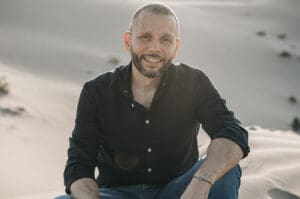Leadership Development in the UAE. Member Spotlight: David Ribott
Usually, when people answer the “who are you” question, they talk about their job or academic background; however, when David answered this one, he said, “I am someone who is in the right place.” David works in professional services through his organization David Ribott International FZ LLE, a socially conscious coaching and consulting boutique company. He leads the support process for his clients in different aspects like creating opportunities and dealing with conflict, especially at the senior level in companies and institutions he sees as “worthy of support.”
Who is David Ribott
 Regarding his purpose in life, David stated that “it is important to walk my talk – to not ‘say something and do a totally different thing’. In my experience and journey, if I am judging people, then I am not helping them,” Hence, as a coach, he works toward supporting his clients resolve and manage their conflicts.
Regarding his purpose in life, David stated that “it is important to walk my talk – to not ‘say something and do a totally different thing’. In my experience and journey, if I am judging people, then I am not helping them,” Hence, as a coach, he works toward supporting his clients resolve and manage their conflicts.
David specializes in leadership development, succession planning, and culture transformation inside the organization, especially with the senior level; in his experience, the more the level is senior, the more the pressure is vital, which raises the opportunity of conflict among them because of the fast rhythm and the unclear atmosphere in these levels.
Within his work, many of the skills he used incoming from his experience as a conflict coach and a mediator, and although he is using them, he faces many challenges, especially with the difference in culture regarding mediation between the USA and UAE, where he is from and where he works, he stated: “mediation in this part of the world is misunderstood, and people usually refer to arbitration instead.”
Teaching Mediation in the UAE
In this context, he stated that his work type is a hybrid one “it is hard to do the traditional mediation setting, especially with the traditional system in the Middle East. I am working with my clients in leadership development using what they like from the outside using my mediation skills from the inside.” There are many cultural differences in the concept of mediation between the Middle East and the West. In his opinion, the first step to bridge these differences is by building trust with individuals; In this context, he stated, “I have two main tools I use, my experience as a conflict coach and my experience as a mediator.” What distinguishes his work in this context is that he focusing on gaining the trust of his customers in the beginning through the use of their same terms and means. He also sees that his work does not stop at the work level, but “helping my client deal with their conflict in work will reflect in their relationship with their family in the home.”
He believes that mediation in its abstract sense is capable and could become more common in the Middle East in the coming years.
Article by Yousra Hasona, MBBI Writer
